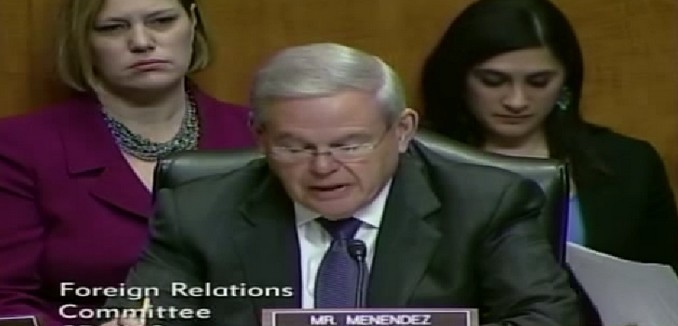In a rare show of bipartisan cooperation, the Senate unanimously passed a proposal put forward by Sen. Mark Kirk (R-Ill.) on Thursday that would re-impose sanctions on Iran if Tehran was found to be in noncompliance with any nuclear agreement. The vote was 100-0.
The nonbinding language is grounded in sections of the Nuclear Weapon Free Iran Act of 2015, commonly known as the Kirk-Menendez bill, which calls for increased pressure on Iran should the Iranians fail to agree to a deal that puts their nuclear program beyond use for weaponization. Senator Kirk said that the amendment was the “key Iran vote of this session of Congress.”
“I hope we can all vote for this because it doesn’t do anything to cause disarray in the negotiations,” said Sen. Barbara Boxer (D-Calif.) on the Senate floor. “What it says is if there is a deal and there’s a break-out by Iran, we’d have a very quick way to restore sanctions.”
The vote took place against the backdrop of controversy generated by an Associated Press story that one of the West’s concessions to Iran during negotiations over its nuclear program was that they would allow the Islamic Republic to continue spinning centrifuges in the fortified underground military bunker at Fordow that they had clandestinely transformed into an enrichment facility.
Sen. Robert Menendez (D-N.J.), the other main sponsor of the Kirk-Menendez bill, expressed his concerns in a press release about the administration’s position with regard to the talks: “My fear is that we are no longer guided by the principle that ‘no deal is better than a bad deal,’ but instead we are negotiating ‘any deal for a deal’s sake’.”
Menendez also said that “an undue amount of trust and faith” is being placed on Iran, which has a history of deception with its nuclear program and is actively destabilizing the Middle East:
“If today’s news report from Lausanne is true, we are not inching closer to Iran’s negotiating position, but leaping toward it with both feet. We have pivoted away from demanding the closure of Fordow when the negotiations began, to considering its conversion into a research facility, to now allowing hundreds of centrifuges to spin at this underground bunker site where centrifuges could be quickly repurposed for illicit nuclear enrichment purposes. My fear is that we are no longer guided by the principle that ‘no deal is better than a bad deal,’ but instead we are negotiating ‘any deal for a deal’s sake’.
“An undue amount of trust and faith is being placed in a negotiating partner that has spent decades deceiving the international community; denying the International Atomic Energy Agency access to its facilities; refusing to answer questions about its nuclear-related military activities; and all the while, actively destabilizing the region from Lebanon to Syria to Iraq to Yemen. A good deal must meet our primary negotiating objective – curtailing Iran’s current and future ability to achieve nuclear weapons capability. If the best deal Iran will give us does not achieve this goal, it is not a good deal for the United States or its partners. A good deal won’t leave Iran as a nuclear threshold state.”
[Photo: SenatorMenendezNJ / YouTube ]




